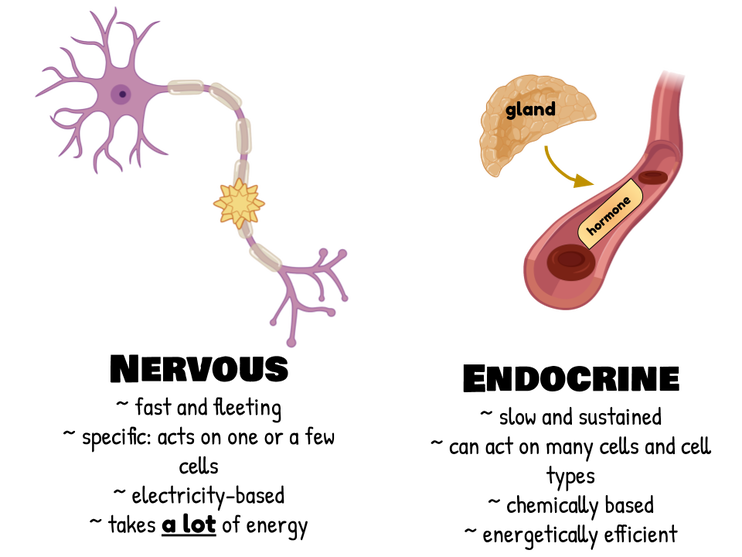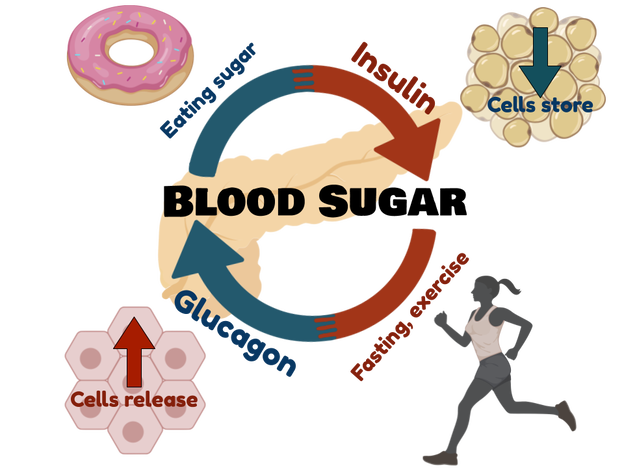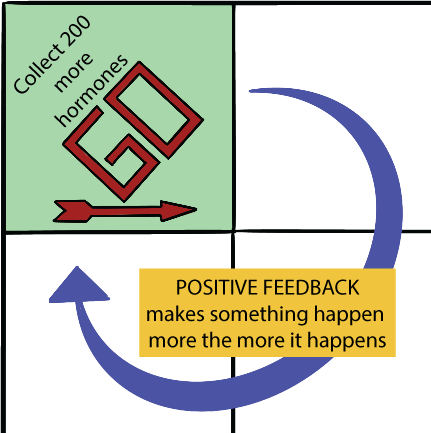the endocrine system
slow, sustained communication
Do you know anyone with diabetes? What about another endocrine disorder, like hypothyroidism, Cushing’s disease, Addison’s disease, or hormonal infertility? How does this affect their life? Do they have to take certain medications or change the way they do things? Are there certain things that they struggle with a lot when they’re most sick?
Sometimes it’s easiest to see just how important something is when it’s not working right, and the endocrine system is no exception. In the last lesson, we learned just how important communication is in the body, because that’s how we orchestrate little changes that keep us in homeostasis and big changes that help us to grow, learn, develop, and adapt to the environment. While the nervous system is absolutely essential in orchestrating many changes that take place in the body, especially ones requiring us to change our behavior in some way or that need to take place within seconds, we also need the endocrine system. But, the nervous system also requires a lot of active energy, so when we can use the more efficient endocrine system, we do.
The endocrine system is great at handling simple tasks that happen all of the time inside of our bodies. It has a few pre-programmed response mechanisms--hormones—that do a certain set number of things. The endocrine system is also great for tasks that require a generalized response from the body, involving many tissues from different organ systems, because they are diffused throughout the entire bloodstream (compare this to nerves, which target a single cell). As long as a reaction doesn’t need to happen within seconds or doesn’t require behavioral changes that require nervous system involvement, the endocrine system is perfect. Unlike the nervous system, it can also efficiently handle tasks that happen over the long-term, because they can achieve a sustained response without constantly using up a ton of energy.
Sometimes it’s easiest to see just how important something is when it’s not working right, and the endocrine system is no exception. In the last lesson, we learned just how important communication is in the body, because that’s how we orchestrate little changes that keep us in homeostasis and big changes that help us to grow, learn, develop, and adapt to the environment. While the nervous system is absolutely essential in orchestrating many changes that take place in the body, especially ones requiring us to change our behavior in some way or that need to take place within seconds, we also need the endocrine system. But, the nervous system also requires a lot of active energy, so when we can use the more efficient endocrine system, we do.
The endocrine system is great at handling simple tasks that happen all of the time inside of our bodies. It has a few pre-programmed response mechanisms--hormones—that do a certain set number of things. The endocrine system is also great for tasks that require a generalized response from the body, involving many tissues from different organ systems, because they are diffused throughout the entire bloodstream (compare this to nerves, which target a single cell). As long as a reaction doesn’t need to happen within seconds or doesn’t require behavioral changes that require nervous system involvement, the endocrine system is perfect. Unlike the nervous system, it can also efficiently handle tasks that happen over the long-term, because they can achieve a sustained response without constantly using up a ton of energy.
The endocrine system is made up of hormones and the glands that make those hormones. Hormones are chemical signals designed to do one set job until that job is done. While the nervous system can handle many different kinds of inputs and produce a wide variety of signals to make a ton of interesting and even unusual things happen, the endocrine system does a few, specific things, and that’s it. But, all of these specific things are incredibly important to our survival! Just think: would we really dedicate so many resources to making something that can only do one thing if that one thing weren’t really important?
If you’d like to know a little more about how your hormones work and some of their functions, check out this video:
If you’d like to know a little more about how your hormones work and some of their functions, check out this video:
We’ll introduce you to a lot more of your body’s most important hormones in the next part of this lesson. For now, let’s look at one important example to get an idea of how hormones do their thing.
blood sugar homeostasis
|
Have you ever felt really high-energy and jittery after eating too much sugar, only to “crash” and have almost no energy a couple of hours later? Well, you have the hormone insulin to thank for this, and it’s all part of the feedback loop that controls blood sugar. We’ll define this term in a moment.
It’s very important that our blood sugar (blood glucose) levels remain within a relatively narrow window (remain in homeostasis). If we have too little blood sugar, we won’t have enough to convert to ATP to run all the reactions that need to happen in our bodies. We’ll feel really tired, and we might even pass out. If this continues over a long time, you could even go into a coma. Being low on blood sugar makes us feel tired, grumpy, and “foggy,” and could even cause more serious medical problems if it continues. But, before you go running to your candy stash to combat this hypoglycemia crisis, we should really mention that having high blood sugar (hyperglycemia) is also not good for you. Unfortunately, too much blood sugar over long periods of time, such as when people have diabetes, causes damage to blood vessels, which can result in heart disease, stroke, kidney failure, vision loss or blindness, and nerve damage, among other problems. In the short-term, it can also make some people feel jittery and on edge, or cause headaches, trouble concentrating, increased urination (due to too much sugar in the urine), and, perhaps counter-intuitively, increased tiredness. You don’t need to memorize these symptoms for this class, but it should help to sell you on an important idea, which we’ve talked about before: It is very important for the body to maintain homeostasis, or keeping everything, on a physiological level, pretty much the same. So, we have great mechanisms to make sure low doesn’t get too low and high doesn’t get too high. |
Hypoglycemia - low blood sugar
Hyperglycemia - high blood sugar
|
insulin and glucagon
Because it is so important to keep blood sugar levels stable, we have two main hormones that regulate it: insulin and glucagon. Insulin lowers blood sugar when it is too high, by telling cells to use more sugar or store it (as fat or glycogen). Glucagon raises blood sugar when it is too low, by telling cells to release stored sugar.
Both insulin and glucagon also have other ways of doing those same jobs, but we won’t worry much about those. The main point is that insulin lowers blood sugar when it is too high and glucagon raises it when it is too low.
A gland called the pancreas is responsible for detecting changes in blood sugar and releasing insulin or glucagon in response. You may also know that the pancreas makes digestive enzymes. Double-duty!
Just to convince you that this all comes back to biochemistry, insulin functions by binding to protein receptors (signalling proteins) on cells, which starts a signalling pathway that eventually tells DNA to start transcribing more glucose transport proteins. More transport proteins in the cell membrane means that more glucose can get into the cell. Glucagon has a similar mechanism, but with the opposite effect (because it’s a different signalling pathway that tells DNA to do a different thing). Biology is chemistry!
A gland called the pancreas is responsible for detecting changes in blood sugar and releasing insulin or glucagon in response. You may also know that the pancreas makes digestive enzymes. Double-duty!
Just to convince you that this all comes back to biochemistry, insulin functions by binding to protein receptors (signalling proteins) on cells, which starts a signalling pathway that eventually tells DNA to start transcribing more glucose transport proteins. More transport proteins in the cell membrane means that more glucose can get into the cell. Glucagon has a similar mechanism, but with the opposite effect (because it’s a different signalling pathway that tells DNA to do a different thing). Biology is chemistry!
feedback loops
Once the pancreas detects that blood sugar has gone back to normal, it stops pumping out hormones. It’s kind of like how you stop driving home when you’re, well, home. This simple idea is called feedback inhibition or negative feedback and is a very important concept in biology. When something needs doing, we do it. When it’s done, we stop. This is one of the most important lessons that you should take away from learning about the endocrine system.
The endocrine system does feedback inhibition all the time. It’s kind of it’s main thing. After all, that’s how we maintain homeostasis and prevent change. As we know, though, sometimes the endocrine system wants to cause change. So, sometimes it also does something called positive feedback. While the name may make you think of getting praised for doing a good job on your report card or being especially nice to someone, in biology, we use the term positive feedback to describe something that happens more when it achieves more of a result. So, I guess, in a way, the overall goal is a little bit like when you get praise and then want to do more of something. In this case, though, it’s a cell pumping out more hormones.
One common example of positive feedback is when the body produces oxytocin when a woman is in labor. You may have heard oxytocin described as the “love hormone,” which it is, in low doses and combined with certain other hormones. In high doses, it forces the uterus to contract to push out a baby. When a woman starts going into labor, she produces oxytocin, which, through positive feedback, causes her to produce more oxytocin, which makes her produce more oxytocin and so on and so on until there’s enough oxytocin to deliver that baby. Wowza! How’s that for a love hormone?
Summary
This video provides a good recap of feedback loops, including the insulin-glucagon loop:
You should understand:
- That the endocrine system uses hormones, which are produced by glands and are chemical signals that have certain set specific functions.
- That endocrine control is slower than nervous system control and can do fewer things, but it can be sustained over the long term and requires less energy input to carry out a certain set of important tasks on a regular basis.
- How insulin and glucagon are important for blood sugar homeostasis, including the specific role of each.
- How feedback inhibition or negative feedback maintains homeostasis, while positive feedback causes change.
Learning Activity
Contributors: Emma Moulton
Some images made with biorender.com
Some images made with biorender.com





